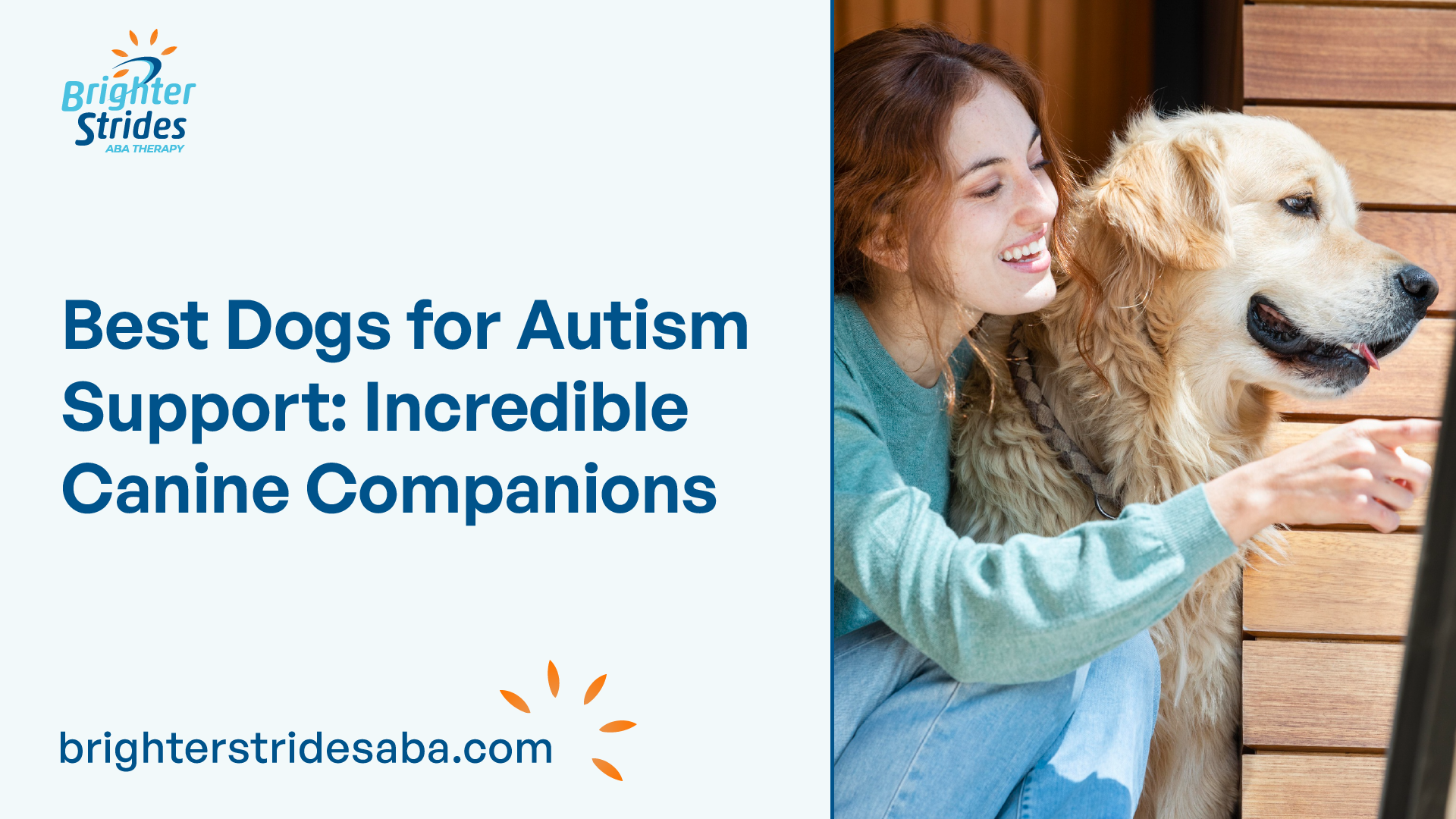Best Dogs for Autism
When it comes to providing support for individuals with autism, dogs have proven to be incredible companions. The benefits of dogs for autism are numerous, and the importance of service dogs in this context cannot be overstated.

Benefits of Dogs for Autism
Research conducted by the University of Lincoln has shown that autistic children have fewer meltdowns in the presence of a pet dog, which significantly lowers their parents’ stress levels. Dogs have also been shown to boost confidence levels, reduce anxiety, improve communication, and help families engage in more activities together.
In fact, a study published by the national institute of health found that 67% of families with autistic children had dogs, and of that 67%, 94% of the parents reported that their autistic children had formed a special bond with the dog. Dogs provide emotional support and companionship, which can be particularly beneficial for individuals with autism who may struggle with social interactions.
Additionally, dogs play a vital role in promoting mental health. According to a study, 16.7% of autistic dog owners reported that their dogs prevented them from taking their own lives, mainly due to the affection and the need to care for the animal [3]. Dogs offer unconditional love and can provide a sense of purpose and responsibility, which can be therapeutic for individuals with autism.
Importance of Service Dogs
Service dogs are specifically trained to assist individuals with autism in various ways. These highly trained animals undergo extensive training to perform tasks that can help mitigate the challenges faced by individuals with autism.
The most commonly reported outcome of animal-assisted intervention (AAI) for autism is increased social interaction, which has been consistently significant across multiple studies [4]. Service dogs can facilitate social interactions by acting as a bridge between the individual with autism and others, helping to reduce social anxiety and promote communication.
Service dogs can also provide a sense of safety and security. They can be trained to prevent the individual from wandering or engaging in potentially harmful behavior. Moreover, these dogs can provide deep pressure therapy, a technique that involves applying gentle pressure to the body to provide a calming effect during moments of distress or anxiety.
It is important to note that obtaining a service dog for autism requires careful consideration and professional guidance. Service dogs undergo specialized training to meet the specific needs of individuals with autism. Each individual’s requirements may vary, and it is essential to work with reputable organizations or trainers to identify the most suitable service dog for autism.
In conclusion, dogs offer numerous benefits for individuals with autism, including reduced stress, improved communication, increased confidence, and enhanced social interactions. Service dogs play a crucial role in providing targeted support and assistance to individuals with autism, helping them navigate daily challenges and improve their overall quality of life.
Top Dog Breeds for Autism
When it comes to finding the best dogs for autism support, certain breeds have shown exceptional qualities that make them well-suited for individuals on the autism spectrum. These breeds not only provide companionship but also offer specific traits that can benefit and assist individuals with autism. Let’s explore three top dog breeds for autism support: Golden Retrievers, Labradoodles/Goldendoodles, and Collies.
Golden Retrievers
Golden Retrievers are a top choice for service dogs and families with special needs children, particularly those with autism spectrum disorder. These dogs have a happy-go-lucky personality, a constant desire to please their owners, and exhibit traits that are gentle, patient, loving, and loyal.
Golden Retrievers are known for their intelligence and trainability, making them excellent candidates for service work. They can be trained to perform specific tasks that assist individuals with autism, such as providing deep pressure therapy, interrupting repetitive behaviors, and acting as a calming presence in stressful situations.
The friendly and sociable nature of Golden Retrievers also helps individuals with autism improve their social skills, as these dogs can act as bridges between them and others. Additionally, their presence can promote a sense of security and emotional support, contributing to overall well-being.
Labradoodles/Goldendoodles
Labradoodles and Goldendoodles are hybrid dogs known for their intelligence, affectionate nature, and hypoallergenic qualities. These breeds are excellent options for families with children on the autism spectrum, as they are allergy-friendly and do not shed excessively.
The playful and loving demeanor of Labradoodles and Goldendoodles can create a strong bond with individuals with autism. These dogs are known for their easy trainability, making them suitable for tasks such as tactile stimulation, emotional support, and providing a sense of routine and predictability.
Labradoodles and Goldendoodles come in various sizes and colors, allowing families to choose the one that best fits their specific needs and preferences. Their versatility and adaptability make them popular choices for autism support dogs.
Collies
Collies are another breed that excels in providing support and companionship to individuals with autism. These dogs are known for their mild-mannered nature, gentleness, and high awareness of human emotions.
Collies are easily trainable and possess a strong desire to please their owners, making them well-suited for therapy work. They can be trained to recognize and respond to the emotional cues of individuals with autism, providing comfort and assistance when needed. Their calm and patient temperament helps create a soothing presence for individuals with autism, reducing anxiety and promoting a sense of security.
Collies are also good with children, making them ideal companions for families with autistic children. Their gentle nature and ability to form strong bonds enable them to navigate the unique challenges that individuals on the autism spectrum may face.
By considering the traits and characteristics of these top dog breeds for autism support, families can make an informed decision when choosing a canine companion. However, it’s important to remember that each individual with autism is unique, and finding the right dog ultimately depends on the specific needs, preferences, and compatibility of both the individual and the dog.
Recommended Breeds for Autism
When it comes to choosing a dog breed for individuals with autism, certain breeds are known for their compatibility and ability to provide support. German Shepherds, Labrador Retrievers, and Poodles are among the recommended breeds that can make excellent companions for individuals with autism.
German Shepherds
German Shepherds are highly regarded as one of the smartest canines and make excellent protectors for families with autistic children. They are known for their intelligence, loyalty, and versatility in handling complicated tasks. German Shepherds can be trained to provide emotional support, assist with sensory integration, and even perform specific tasks to help individuals with autism navigate their daily lives.
Labrador Retrievers
Labrador Retrievers are considered good breeds for individuals with autism. They are known for their friendly and gentle nature, making them suitable companions for individuals of all ages. Labrador Retrievers are highly trainable and have a natural inclination to please their owners. These qualities, combined with their loyalty and adaptability, make them well-suited to provide emotional support and assistance to individuals with autism.
Poodles
Poodles are another recommended breed for individuals with autism. They are known for their friendly and affectionate nature, making them excellent companions for individuals with autism. Poodles are highly adaptable and can easily adjust to different environments and situations. They are intelligent and eager to please, making them trainable and responsive to commands. Poodles can provide emotional support, help create a calming environment, and offer a sense of security for individuals with autism.
These recommended breeds – German Shepherds, Labrador Retrievers, and Poodles – possess qualities that make them well-suited for individuals with autism. However, it’s important to remember that each individual and their specific needs may vary. When selecting a dog for autism support, it’s crucial to consider factors such as temperament, compatibility, and the specific requirements of the individual. Proper training and socialization are also essential to ensure a successful bond between the dog and the individual with autism.
Service Dogs for Autism
Service dogs play a vital role in providing assistance and support to individuals with autism. These well-trained dogs are specifically matched with individuals based on their needs and preferences. Let’s explore the training and tasks of service dogs for autism, as well as the impact they have on individuals.
Training and Tasks
Service dogs for autism undergo extensive training to ensure they can effectively assist individuals with autism. They are trained to perform various tasks that cater to the specific needs of their handlers. Some common tasks include:
- Sensory Support: Service dogs can provide deep pressure therapy by leaning against their handler, which can help reduce anxiety and provide a calming effect. They can also interrupt repetitive behaviors or redirect the individual’s attention during meltdowns or stressful situations.
- Safety Assistance: Dogs are trained to prevent children from wandering or bolting in unsafe situations. They can be tethered to the child or use specially designed tracking devices to ensure their safety.
- Social Support: Service dogs can encourage social interaction by acting as a bridge between the individual with autism and others. They can help initiate conversations and create opportunities for social engagement.
- Emotional Support: Dogs provide unconditional love and companionship, which can have a positive impact on the emotional well-being of individuals with autism. They can provide comfort during times of distress and help reduce feelings of loneliness.
The training process for service dogs typically involves obedience training, socialization, and specialized tasks tailored to meet the specific needs of individuals with autism. It is important to note that service dogs undergo rigorous training from professional organizations or certified trainers to ensure they are well-prepared to assist their handlers.
Impact on Individuals
The impact of service dogs on individuals with autism is significant. Research has shown that having a pet dog, including service dogs, can result in various benefits for individuals with autism and their families. According to the University of Lincoln, autistic children have fewer meltdowns in the presence of a pet dog, which significantly lowers their parents’ stress levels. Dogs have been shown to boost confidence levels, reduce anxiety, improve communication, and help families engage in more activities together.
In a study published by the National Institute of Health, it was found that 67% of families with autistic children had dogs, and 94% of parents reported that their autistic children had formed a special bond with the dog [2]. Furthermore, 16.7% of autistic dog owners reported that their dogs prevented them from taking their own lives, mainly due to the dog’s affection and the need to care for the animal.
The presence of a service dog can have a profound impact on the overall well-being of individuals with autism. These dogs provide not only practical assistance but also emotional support, helping individuals navigate the challenges they face and enhancing their quality of life.
Service dogs for autism are remarkable companions and assistants, offering invaluable support to individuals with autism and their families. The bond formed between these specially trained dogs and individuals with autism can be life-changing, providing a sense of security, comfort, and a newfound level of independence.
Canine Autism and Support
Understanding the signs of canine autism and exploring treatment options is essential for providing proper support to dogs with this condition. Canine autism, also known as canine dysfunctional behavior, is believed to be congenital in nature, with affected dogs lacking certain mirror neurons in their brains necessary for learning social norms [6].
Signs of Canine Autism
Identifying signs of autism in dogs can be challenging, as the diagnosis involves ruling out other medical and behavioral conditions. However, there are certain behaviors and symptoms that may indicate the presence of canine autism. These include:
- Antisocial behaviors and difficulty with social interactions
- Communication issues and difficulty understanding or responding to commands
- Obsessive-compulsive behaviors, such as repetitive movements or fixations
- Inappropriate reactions to stimuli, such as overreacting or exhibiting fear
- Lethargy and reduced physical activity
It’s important to note that these signs may vary in severity and manifestation from dog to dog. If you suspect that your dog may have autism, it is crucial to consult with a veterinarian who can provide a proper diagnosis and guidance on the best course of action [6].
Treatment Options
While there is no cure for canine autism, there are various treatment options available to help manage the symptoms and improve the quality of life for dogs with this condition. Treatment for canine autism typically involves a multi-faceted approach that addresses different aspects of the dog’s well-being.
- Medication: In some cases, medication may be prescribed to curb symptoms and provide relief from anxiety or compulsive behaviors. It is important to work closely with a veterinarian to determine the most suitable medication and dosage for the individual dog.
- Creating a Safe Environment: Providing a safe and secure space for the dog is essential. Creating a stress-free environment with designated areas for rest and relaxation can help reduce anxiety and provide a sense of security.
- Regular Exercise: Regular exercise helps dogs with autism to release excess energy and promotes overall well-being. Engaging in physical activities tailored to the dog’s abilities can help reduce anxiety and improve mood.
- Well-Balanced Diet: A well-balanced diet is crucial for the overall health of the dog. Consult with a veterinarian to ensure the dog is receiving appropriate nutrition to support their specific needs.
- Positive Reinforcement and Training: Working with trainers or therapists specializing in behavioral issues can be beneficial. Positive reinforcement techniques can help shape desired behaviors and improve communication between the dog and their human companions.
If you suspect that your dog may have autism, it is important to contact a veterinarian who can provide a proper diagnosis and guide you in developing an individualized treatment plan. Early intervention and appropriate support can greatly enhance the well-being and quality of life for dogs with autism.
Understanding Canine Behavior
When it comes to understanding canine behavior, it’s important to recognize that dogs, like humans, can exhibit certain characteristics that may resemble autism-like symptoms. While autism in dogs, known as canine dysfunctional behavior, is an idiopathic condition with congenital origins, veterinarians have observed specific traits in dogs that may be associated with autism.
Autism-Like Symptoms
Dogs with autism may display a variety of symptoms that can vary in severity and presentation. Some common autism-like symptoms in dogs include:
- Antisocial behaviors: Dogs with autism may struggle with social interactions and exhibit a lack of interest in engaging with other dogs or humans.
- Communication issues: They may have difficulty understanding or responding to verbal and non-verbal cues, making it challenging to communicate effectively.
- Obsessive-compulsive behaviors: Dogs with autism may engage in repetitive behaviors, such as tail chasing or excessive licking, which provide them with a sense of comfort.
- Inappropriate reactions to stimuli: They may react in an unusual or exaggerated manner to certain stimuli, such as loud noises or sudden movements.
- Lethargy and reduced physical activity: Dogs with autism may appear less energetic or enthusiastic about physical activities compared to their counterparts.
It’s important to note that diagnosing autism in dogs can be challenging, as it involves ruling out other medical and behavioral conditions. If you suspect that your dog may be exhibiting autism-like symptoms, it is recommended to consult with a veterinarian for a proper diagnosis and guidance.
Seeking Veterinary Care
If you observe signs of autism or autism-like symptoms in your dog, it is crucial to seek veterinary care. Veterinarians are trained to assess and diagnose various behavioral conditions, including autism in dogs. They will conduct a thorough examination, consider the dog’s medical history, and rule out other potential causes for the observed behaviors.
In the event that autism is suspected, the veterinarian may provide a recommended course of action. Treatment for autism in dogs often involves a combination of approaches. This may include medication to address specific symptoms and provide relief, creating a safe and secure environment, maintaining stress-free surroundings, ensuring regular exercise, providing a well-balanced diet, and utilizing positive reinforcement techniques through trainers or therapists specializing in behavioral issues.
Remember, early detection and intervention can make a significant difference in managing and improving the quality of life for dogs with autism. If you have concerns about your dog’s behavior, don’t hesitate to reach out to a veterinarian for professional guidance and support.
References
- https://www.dogsforgood.org/2017/03/10-ways-dogs-are-helping-people-with-autism/
- https://www.angelsense.com/blog/best-dog-breeds-for-autism/
- https://www.nature.com/articles/s41598-021-02504-8
- https://www.ncbi.nlm.nih.gov/pmc/articles/PMC6510492/
- https://usserviceanimals.org/blog/best-dog-breeds-for-autism/
- https://petcheckurgentcare.com/signs-of-autism-in-dogs/




